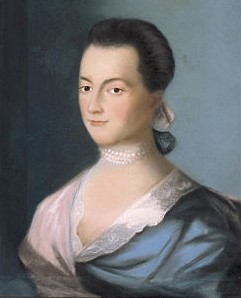
The Abigail
Adams Chapter, NSDAR, was organized on
August 17, 1893, in Des Moines, Iowa, with
15 charter members. The organizing chapter
regent put in several months of
concentrated efforts to interest women of
the city and the surrounding counties to
form a chapter with the National Society
having been formed on October 11, 1890.
She put notices in the local press and
county papers of an open house where she
explained the objectives and goals of the
DAR and the required documentation needed
to be eligible for membership, and she
assisted prospective members in obtaining
the required documentation. Her dream of
forming a new chapter came true in her
home in May 1893.
The highlight of 1908 was the dedication
of the stone marker on the site of the
second Old Fort Des Moines, at the
northeast corner of the children’s
playground at First and Elm Streets.
Directly behind the monument was a
flagstaff from which the Stars and Stripes
were to wave on all fair days. The bronze
tablet is pictured on the right.
|
The site was
selected by Isaac Brandt, a
member of the Park
Commissioners, who had assisted
with the project, and in his
words, “Every streetcar going to
New Fort Des Moines will pass
this monument of the Old Fort.”
He was one of the oldest
residents of the city, and he
was selected by the Abigail
Adams Chapter, NSDAR, to locate
the site. The military-style
ceremony was under the command
of Colonel West of the 2nd
U.S. Cavalry.
|
 |
|
Residing in
the third and last Fort Des
Moines, the 2nd
Cavalry sat on their mounts with
sabers drawn in salute, and the
2nd Cavalry Band on
their white mounts played the
"Star Spangled Banner." While
the band played, a former regent
under whom this project was
started, unveiled the marker by
hoisting Old Glory to the top of
the flagstaff. As the band
finished, she pronounced these
words: “On behalf of Abigail
Adams Chapter, I present this
memorial to the City of Des
Moines.” On either side of her
were Colonel West and the
current chapter regent at that
time.
|
 |
In 1938, a
second bronze plaque was added
to the north face of the Fort
Des Moines monument: "Here
passed the Dragoon Trail,
blazed in 1835 by the First
U.S. Dragoons under Colonel
Stephen W. Kearney. Marked by
Iowa Daughters of the American
Revolution 1938."
|
|
A letter
dated April 13, 1908, to the
Abigail Adams Chapter, NSDAR,
reads thus: “No. 32 General
Assembly had made an
appropriation whereby the
flags which were carried by
the 4th Regiment
and other troops from Iowa
during the Spanish American
War are to be placed in a case
in the rotunda of the Capitol
Building, sets April 25, 1908,
as date of ceremonies of
placing said flags in cases,
and as said flags were
presented to the 51st
Iowa Infantry by Abigail
Adams, it affords the
Committee great pleasure to
extend to you a cordial
invitation to be present at
said ceremonies to participate
with us in placing these
colors in their last resting
place. W. H. Thrift, Adj. Gen.
– John Loper, Late Co. 51st
Iowa Infantry, U.S.A."
|
 |
On
November 8, 1926, the
meeting was given over to
the planting of a Henry C.
Wallace memorial tree on the
lawn of Hoyt Sherman Place.
Henry C. Wallace had been a
leader of Des Moines civic
activities, especially the
YMCA and the Red Cross. He
helped establish 4-H
(head-heart-hands-health)
and extension programs in
Iowa. He was a publishing
partner and editor of
Wallace's Farmer magazine.
In 1921, he became U.S.
Secretary of Agriculture.
The report of the recording
secretary indicates that
"The Chapter is indebted to
Mrs. and Mrs. C. E. Hunn for
the tree and stone that
holds the bronze plate
identifying the spot."
|
|
In
December 1933, a place
marker was dedicated and
presented to the city of
Des Moines. The three-ton
boulder of pink Minnesota
granite bears the bronze
DAR Insignia in one corner
and was located to form
the central point of
interest in the city
beautification plan. The
boulder was placed between
the Municipal Building and
the Armory to be erected
by the American Legion. It
is pictured on the left.
|

|
|

|
On October
8, 1934, Abigail Adams
Chapter, NSDAR, opened
its season by dedicating
a bronze tablet at Hoyt
Sherman Place. The
tablet was presented to
the city of Des Moines
and accepted by Mayor
Dwight Lewis. Later it
was placed on a building
on the northeast corner
of 9th and Locust and
marked the site of the
first public school
building in Des Moines.
|
|
In
an 18-month-long
project, the five DAR
historical markers in
downtown Des Moines
were restored to their
original elegance.
Exciting development
in the core of the
city made this the
ideal time.
Construction of the
Principal Riverwalk, a
weekly Farmers Market
on Court Avenue, and
the extension of M.L.
King Parkway, all
bring much higher
visibility to our Fort
Des Moines and Dragoon
Trail monuments.
North on the river,
the creation of
Brenton Skating Rink,
renovations at Des
Moines Botanic Garden,
and the new landmark
footbridge, have
greatly increased
public traffic at the
Grand Avenue boulder
monument, as well.
Hoyt Sherman Place, a
mansion cum theater,
is pivotal
architecture in the
historic Sherman Hill
neighborhood. Our
memorial to Henry
Wallace sees almost
daily crowds on the
lawn of this venue for
concerts, lectures,
receptions, and
ceremonies.
|
|



